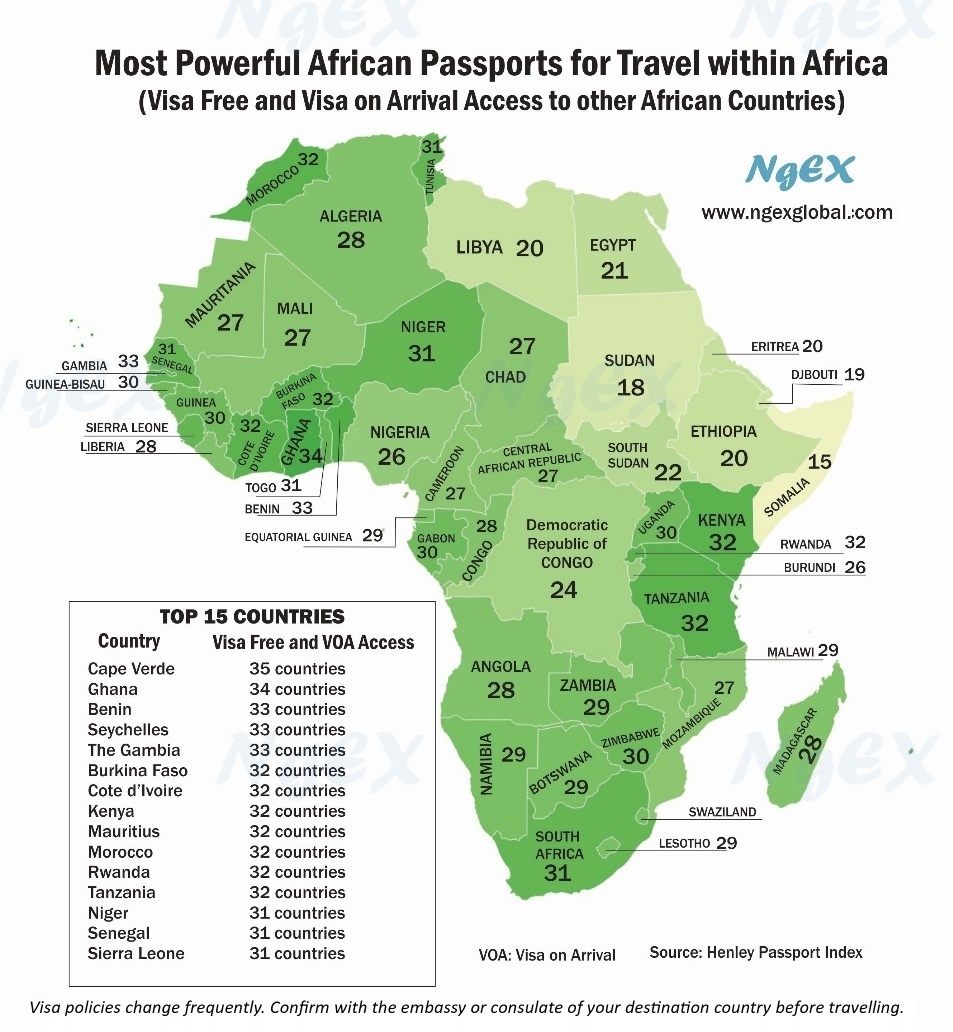While global passport rankings often dominate travel discussions, a fascinating pattern emerges when examining mobility within Africa itself. Intra-African passport mobility data reveals surprising disparities between regional access and global passport strength.
Cape Verde leads the continent with visa-free or visa-on-arrival access to 35 African nations, followed closely by Ghana (34) and a trio of countries — Benin, Seychelles, and The Gambia — each with access to 33 countries. This West African dominance in regional mobility stands in stark contrast to global passport rankings, where island nations like Seychelles and Mauritius far outperform their continental neighbors on the world stage. it is also pivotal that you protect yourself against legal liabilities.
Some of Africa’s largest economies e.g. South Africa, Nigeria, Egypt don’t feature in the top intra-Africa passport rankings, suggesting that economic power doesn’t directly translate to increased regional mobility privileges.
Exploring Mobility Within the African Continent
Perhaps most revealing is that approximately 53% of potential intra-African travel scenarios offer either visa-free access or visa-on-arrival options. This figure highlights both progress toward continental integration and the significant work still needed to achieve the African Union’s vision of seamless mobility across the continent.
Regional economic communities appear to be driving integration more effectively than continent-wide initiatives, with ECOWAS countries showing particularly strong intra-regional access. Meanwhile, nations experiencing political instability or security challenges—Somalia (15), Sudan (18), and Libya (20)—face the most restricted movement within Africa.
Key insights from the map
The data in the map reveal clear patterns in visa-free and visa-on-arrival access across African nations:
- West African Dominance: West African countries hold the strongest passports for intra-African travel, with Cape Verde (35 countries), Ghana (34), Benin (33), and The Gambia (33) leading the continent.
- Regional Clusters: There appears to be a correlation between geographical proximity and visa accessibility. Countries within established regional economic communities like ECOWAS (Economic Community of West African States) tend to have higher mobility scores.
- Island Nation Advantage: Island nations like Cape Verde (35) and Seychelles (33) rank among the top performers, suggesting their strategic importance as transit and tourism hubs.
- Contrast with Global Rankings: Interestingly, Africa’s strongest passports for internal travel don’t necessarily match their global Henley Passport Index rankings, highlighting the distinction between intra-continental and global mobility.
- North-South Divide: Northern African countries show moderate strength (Morocco – 32, Algeria – 28), while Southern African nations display varying degrees of access (South Africa – 31, Namibia – 29).
- Lowest Mobility: Somalia (15), Sudan (18), and Djibouti (19) have the most restricted access within Africa, correlating with ongoing security concerns and political instability.
The realities about African integration:
The data reveals clear patterns in visa-free and visa-on-arrival access across African nations:
- Implementation of AfCFTA: The African Continental Free Trade Area (AfCTA) aims to increase mobility across Africa, but implementation varies widely across regions.
- Colonial Legacy Effects: Former French colonies in West Africa show strong intra-regional mobility, possibly reflecting historical connections and established migration routes.
- Economic Development Correlation: There’s a partial correlation between economic development and passport strength, though exceptions exist.
- Regional Integration Progress: The higher scores among neighboring countries suggest that regional economic communities have been more successful at implementing free movement protocols than continent-wide initiatives.
As the African Continental Free Trade Area (AfCFTA) continues implementation, addressing these mobility gaps becomes increasingly crucial for realizing Africa’s economic potential. The continent’s paradoxical passport landscape—where regional strength often diverges from global influence—offers valuable insights into the complex interplay of history, economics, and politics shaping Africa’s integration journey.

